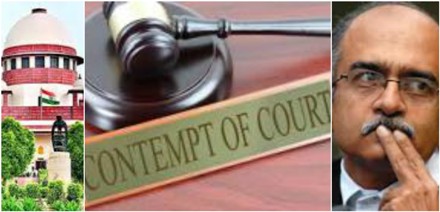

By Sunil Garodia
First publised on 2020-08-17 08:04:49
The Supreme Court is the final arbiter of all things legal in India. Therefore, it has a huge responsibility in upholding the dignity and sanctity of the judicial process, without which enforcement of the law will not be possible to the fullest extent. But in doing so, the court has to be far more liberal and flexible than it has been, particularly in interpreting the provisions of contempt of court. In the order holding Prashant Bhushan guilty of contempt, the court has not considered the right to freedom of expression but has chosen to treat the tweets of the alleged offender as "malicious" and "scandalous" in nature.
The dignity and sanctity of the court, as well as the judicial process, is harmed if, and only if, malicious motives are attributed to orders passed by the honourable courts or individual judges are targeted for having passed any orders likewise. Unfound allegations of serious nature (including but not limited to deceit, corruption, ulterior motives and bias) against the court or individual judges should definitely count as a malicious attempt to lower the dignity of the court or the judges and obstruct the judicial process.
But the court has to be magnanimous in treating criticism and even if it takes cognizance of some such remarks, must be liberal enough to point out the reason for its attention and let off the offender with a warning. The nation will then know where the offender erred and why the court thought it fit to pull her or him up. Repeated and unwarranted attacks by the same offender will obviously invite punishment as per the provisions of the law.
Also, the time has come to clearly define what constitutes contempt, especially what is precisely meant by "scandalizing the courts". Although the Law Commission, in its report in 2018, suggested that the case against doing away with criminal contempt in India was weak and advised against it, there are several grey areas in the law that are in conflict with the constitutional right to freedom of speech and expression. These need to be addressed properly if criminal contempt stays on the statute books.











